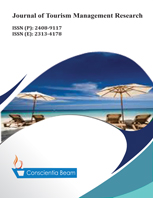Residents Perception of Impacts toward Tourism Development: The Case of Bandung City, Indonesia
DOI:
https://doi.org/10.18488/journal.31.2019.61.29.44Abstract
This article examines residents’ perceptions of the impacts of tourism development in Bandung City, Indonesia. The study aims to evaluate the 2009-2013 tourism policy and program’s outcomes. It uses primary data from the qualitative method of interviewing residents. Interviews were conducted in eight Bandung City districts during November 2014 and March 2016. The respondents were chosen based on the understanding that residents often do not represent a homogeneous population (Brunt and Courtney, 1999). Therefore, the respondents were divided into four types. The data analysis is modeled after Ritchie and Spencer (1994)’s framework method. The study found that the citizens’ common perception of a socio-economic impact are business opportunities. The perceived negative socio-cultural impacts was that the use of a local language, Sundanese, was declining due to tourism. The others included vandalism, and the increase of shopping places and culinary places affecting the citizens’ lifestyle via consumerism. Concerning local art and culture, type two, three and four respondents confessed that Bandung City tourism lacked cultural attractions. In contrast, type one of respondent admitted that tourism has the effect of reviving local art and culture and that they had experienced acculturation in traditional music. It shows that the local government efforts of promoting cultural tourism does not affect other residents living in other areas.

